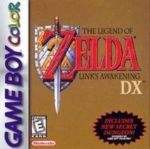The Legend of Zelda: Link's Awakening

| |
| Link's Awakening | |
| Developer | Nintendo EAD Nintendo R&D1 (DX) |
| Publisher | Nintendo |
| System | Game Boy, Game Boy Color, 3DS Virtual Console |
| Release Date | Game Boy JP June 6, 1993 US August 1993 EU November 18, 1993 Game Boy Color JP December 12, 1998 US December 31, 1998 EU February 11, 1999 3DS Virtual Console (GBC) US June 7, 2011 JP June 8, 2011 EU June 8, 2011 SK March 2, 2016 |
| Genre | Adventure |
| Gallery | GH Gallery |
| Rating | ESRB: E |
The Legend of Zelda: Link's Awakening is the fourth game in the Zelda series and the first one to be released for a handheld system (not counting the Game & Watch game).
Story[edit]
Link has gone on his own journey after defeating Ganon. However, a storm at sea leaves Link shipwrecked on the mysterious Koholint Island. Link discovers that he needs to gather seven instruments and use the to awaken the sleeping Wind Fish before he can leave the island. But there are deeper and darker secrets hidden within the island.
Gameplay[edit]
The gameplay style is similar to the previous game, The Legend of Zelda: A Link to the Past. Many items and enemies from the game appear throughout Link's Awakening. However, some areas of the game also incorporated sidescrolling elements. The sidescrolling areas were more similar to the brief sidescrolling areas of The Legend of Zelda rather than Zelda II: The Adventure of Link.
Curiously, this game is known for the various references to other Nintendo games, especially Mario references. The character of Tarin is physically based on Mario and has some strange experiences involving mushrooms and transforming into a raccoon. A doll of Yoshi and a photo of Princess Peach appear, and the long-missing Wart from Doki Doki Panic and Super Mario Bros. 2 makes a surprise cameo appearance. Additionally, various Mario enemies are found in the games, and several Chain Chomps appear as tamed pets.
There are also references to other games aside from the Mario series. The game contains an enemy based on Kirby, a character named Mr. Write (based on Dr. Wright of SimCity fame) and a random guest appearance by Richard, star of the Japan-only game Kaeru no Tame ni Kane wa Naru.
Continuity Notes[edit]
- The official timeline of the Hyrule Historia initially established that Link's Awakening takes place after the linked ending of Oracle of Seasons/Ages, which does depict Link sailing away with what appears to be a storm in the distance. Nintendo has since revised the timeline's order so that Link's Awakening is now considered to take place before the Oracle games. All three games follow A Link to the Past and feature the same Link, and they are set on the branch of the timeline which follows a hypothetical alternate version of Ocarina of Time in which Link failed to defeat Ganon.
- The instruction manual story mentions Link's defeat of Ganon, which seemed to be referring to the preceding game A Link to the Past. Link also has the same official art as in A Link to the Past. However, the game's premise was still vague enough to theoretically place it after nearly any Zelda game where Link defeated Ganon.
Legacy[edit]
Link's Awakening seems to be the most well-known and popular of the handheld Zelda games. The later handheld games - particularly Oracle of Seasons and Oracle of Ages - were also inspired by Link's Awakening.
Sequels[edit]
Link's Awakening had no direct sequels, although it was spiritually succeeded by the Oracle games. Ocarina of Time was the next Zelda game to be released.
Ports and Remakes[edit]
- In 1998, a colorized version known as Link's Awakening DX was released for the Game Boy Color. Aside from modifying the graphics to take advantage of the Game Boy Color's advanced palette, Link's Awakening DX also added a new dungeon.
- In Japan, Link's Awakening DX was later released as part of the Nintendo Power system.
- In 2011, Link's Awakening DX was released for download via the 3DS's eShop as part of the 3DS Virtual Console. It was the first Game Boy Color game to be available.
- In 2019, it received a full remake for the Nintendo Switch. In addition to updating the graphics and gamplay, it added a new dungeon maker mode. It also retained some of the DX version's changes, such as the Color Dungeon.
- In February 2023, the DX version was among the first games added to the Nintendo Switch's library of Game Boy games that could be played by Nintendo Switch Online subscribers.
See Also[edit]